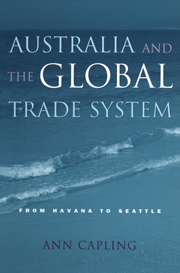Book contents
- Frontmatter
- Contents
- List of Tables and Figures
- Acknowledgments
- List of Abbreviations
- Introduction
- 1 ‘The Enfant Terrible’: Australia and the Reconstruction of the Multilateral Trade System
- 2 Coming to Terms with Multilateralism
- 3 Damage Control, Policy Stasis and Diplomatic Paralysis
- 4 Policy Innovation, Diplomatic Departures and the Uruguay Round
- 5 The Cairns Group
- 6 Aggressive Multilateralism: Negotiating Services
- 7 The American Way? Aggressive Bilateralism in Australian Trade Policy
- 8 The WTO System in Crisis
- Conclusion
- Appendix 1 Departments and Ministers responsible for GATT/WTO Negotiations
- Appendix 2 GATT Trade Runds
- Notes
- Index
2 - Coming to Terms with Multilateralism
Published online by Cambridge University Press: 07 October 2011
- Frontmatter
- Contents
- List of Tables and Figures
- Acknowledgments
- List of Abbreviations
- Introduction
- 1 ‘The Enfant Terrible’: Australia and the Reconstruction of the Multilateral Trade System
- 2 Coming to Terms with Multilateralism
- 3 Damage Control, Policy Stasis and Diplomatic Paralysis
- 4 Policy Innovation, Diplomatic Departures and the Uruguay Round
- 5 The Cairns Group
- 6 Aggressive Multilateralism: Negotiating Services
- 7 The American Way? Aggressive Bilateralism in Australian Trade Policy
- 8 The WTO System in Crisis
- Conclusion
- Appendix 1 Departments and Ministers responsible for GATT/WTO Negotiations
- Appendix 2 GATT Trade Runds
- Notes
- Index
Summary
In the general elections of December 1949 the Liberal–Country Party coalition led by Robert Gordon Menzies defeated the Labor government which had held office since 1941. Despite the ideological differences between Labor and the coalition parties, the Menzies government continued to promote the national development strategy first mapped out by the Chifley government. Thus the new government remained actively committed to the objectives of full employment, industrial development and mass immigration. None the less, a change in Australian trade policy could have been expected, especially given the coalition parties' opposition to the erosion of imperial preference in the late 1940s. Indeed, by the late 1940s there was considerable disquiet about Australia's involvement in the GATT. Producer groups were divided over the merits of the new multilateral trade system: horticulturists, manufacturers and trade unions demanded that Australia withdraw from the GATT while graziers and grain growers remained generally supportive of the Agreement. These societal divisions were mirrored within the bureaucracy: Trade and Customs clung to the discriminatory trade agreements of the prewar period whereas Commerce and Agriculture was much more internationalist and forward-looking in its approach to trade policy. Even within the Cabinet itself, Menzies' strong attachment to the British Commonwealth, imperial preference, and the ‘ties that bind’ was at odds with the views of Commerce Minister John McEwen, a Country Party politician who was considerably less sentimental and more pragmatic in his approach to Australia's external economic relations.
- Type
- Chapter
- Information
- Australia and the Global Trade SystemFrom Havana to Seattle, pp. 36 - 65Publisher: Cambridge University PressPrint publication year: 2001

